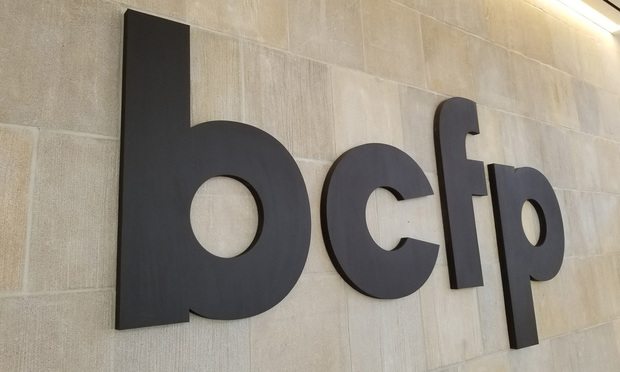CFPB, Locked in Discovery Dustup, Denies Withholding Documents From Navient
The Consumer Financial Protection Bureau is disputing student loan lender Navient's claim that it has provided just a small fraction of documents that could be critical to the company's defense.
November 06, 2018 at 05:33 PM
5 minute read
 CFPB headquarters in Washington, D.C. Credit: C. Ryan Barber
CFPB headquarters in Washington, D.C. Credit: C. Ryan Barber
A year ago this month, White House budget director Mick Mulvaney took control of the Consumer Financial Protection Bureau and made no secret that change was coming to an agency long vilified by his fellow Republicans.
Noting repeatedly that elections had consequences, he advocated a softer enforcement approach, dropped pending lawsuits and declared an end to the days of the CFPB “pushing the envelope.” But a year later, the CFPB is showing no signs of pulling back from what is perhaps its most prominent pending enforcement action: a case, brought just days before President Donald Trump's inauguration, against the student loan company Navient.
For the past year, the CFPB has been locked in a bitter discovery dispute with Navient, which has accused the agency of withholding thousands of documents the company sees as potentially critical to its defense against allegations that it misled borrowers and made mistakes that added billions of dollars to repayment bills.
In a recent court filing, the bureau disputed Navient's claim that it has provided just a small fraction of documents that could be critical to the company's defense in Pennsylvania federal district court. Navient was hunting for, among other things, any CFPB communication with Congress and the media.
“For example, the CFPB has produced only a single communication from the CFPB to a congressional staffer. It is completely implausible that the CFPB communicated with congressional members and staff only once over the course of this highly politicized five-year investigation,” wrote Wilmer Cutler Pickering Hale and Dorr partner Jonathan Paikin, in an Oct. 10 letter to U.S. District Judge Robert D. Mariani of the Middle District of Pennsylvania.
The CFPB said its records search had uncovered no communications with Congress or the media before the agency sued Navient. The agency did not appear surprised by that result.
“The lack of responsive documents makes perfect sense. With limited exceptions not applicable here, the bureau's investigations are not public until a settlement is reached or a lawsuit is filed,” CFPB enforcement attorney Nicholas Jabbour wrote in court papers. “Thus, as a general matter, the bureau does not communicate with Congress or the media about its investigations.”
According to The New York Times, the CFPB had been in settlement talks with Navient in 2016, only to see them break down following Trump's victory over Hillary Clinton. In recent months, concerned that Mulvaney's comparatively light-handed approach would lead the CFPB to ease up on Navient, state attorneys general—including Xavier Becerra in California—have filed their own lawsuits against the company.
Davis Wright Tremaine partner Jonathan Engel, a former CFPB enforcement attorney, said the recent activity in the agency's case against Navient doesn't suggest enforcers are preparing to back down.
“They've had a year now to take a fresh look at things and have done nothing but continue to fight it,” Engel said, referring to Mulvaney and his leadership team. “That is plenty of window for Navient to have made an offer that would have allowed the bureau to walk away gracefully, and it hasn't happened.”
In its October letter to Mariani, Navient's attorneys questioned the CFPB's claim that the vast majority of documents—picked up using the company's requested search terms—were “false positives” and all but accused the agency of selectively sifting out records.
Navient said “it appears, based on conversations with the CFPB, that the agency has taken the view that only documents supporting its claims are relevant, and is withholding everything else, including potentially exculpatory evidence.”
The company complained it has “no way to test the CFPB's assertions, for instance, that the 130,000 documents that hit on the term 'Navient' or the 90,000 documents that hit on the term 'Pioneer' are irrelevant or non-responsive,” a reference to the Navient subsidiary Pioneer Credit Recovery, which collects student loans in default.
“But one could only imagine the CFPB's skepticism if [Navient] had produced less than 1 percent of the documents identified in response to tailored search terms of key custodians,” Navient added, suggesting that it be allowed to review all documents and determine their relevancy to the case.
The CFPB said this month it has complied with all of its discovery obligations and that Navient had raised no “legitimate argument to the contrary.”
“The bureau,” Jabbour wrote, “respectfully submits that the parties' efforts should not be diverted from the huge amount of work that is left to be completed.”
Read more:
CFPB Suffers Another Appeals Court Loss Over Investigative Authority
Consumer Bureau Reaches $30M Settlement With TCF National Bank
CFPB's Dodd-Frank Suit Against Navient Can Proceed
➤➤ Our weekly briefing Compliance Hot Spots provides the latest news and trends in compliance and enforcement—what regulators are up to and how firms and in-house counsel are crafting new strategies. Learn more and sign up here.
This content has been archived. It is available through our partners, LexisNexis® and Bloomberg Law.
To view this content, please continue to their sites.
Not a Lexis Subscriber?
Subscribe Now
Not a Bloomberg Law Subscriber?
Subscribe Now
NOT FOR REPRINT
© 2025 ALM Global, LLC, All Rights Reserved. Request academic re-use from www.copyright.com. All other uses, submit a request to [email protected]. For more information visit Asset & Logo Licensing.
You Might Like
View All
Saxton & Stump Lands Newly Retired Ex-Chief Judge From Middle District of Pa.
3 minute read
Blank Rome Snags Two Labor and Employment Partners From Stevens & Lee
4 minute read
12-Partner Team 'Surprises' Atlanta Firm’s Leaders With Exit to Launch New Reed Smith Office
4 minute read
Morgan Lewis Shutters Shenzhen Office Less Than Two Years After Launch
Trending Stories
- 1Reviewing Judge Merchan's Unconditional Discharge
- 2With New Civil Jury Selection Rule, Litigants Should Carefully Weigh Waiver Risks
- 3Young Lawyers Become Old(er) Lawyers
- 4Caught In the In Between: A Legal Roadmap for the Sandwich Generation
- 5Top 10 Developments, Lessons, and Reminders of 2024
Who Got The Work
J. Brugh Lower of Gibbons has entered an appearance for industrial equipment supplier Devco Corporation in a pending trademark infringement lawsuit. The suit, accusing the defendant of selling knock-off Graco products, was filed Dec. 18 in New Jersey District Court by Rivkin Radler on behalf of Graco Inc. and Graco Minnesota. The case, assigned to U.S. District Judge Zahid N. Quraishi, is 3:24-cv-11294, Graco Inc. et al v. Devco Corporation.
Who Got The Work
Rebecca Maller-Stein and Kent A. Yalowitz of Arnold & Porter Kaye Scholer have entered their appearances for Hanaco Venture Capital and its executives, Lior Prosor and David Frankel, in a pending securities lawsuit. The action, filed on Dec. 24 in New York Southern District Court by Zell, Aron & Co. on behalf of Goldeneye Advisors, accuses the defendants of negligently and fraudulently managing the plaintiff's $1 million investment. The case, assigned to U.S. District Judge Vernon S. Broderick, is 1:24-cv-09918, Goldeneye Advisors, LLC v. Hanaco Venture Capital, Ltd. et al.
Who Got The Work
Attorneys from A&O Shearman has stepped in as defense counsel for Toronto-Dominion Bank and other defendants in a pending securities class action. The suit, filed Dec. 11 in New York Southern District Court by Bleichmar Fonti & Auld, accuses the defendants of concealing the bank's 'pervasive' deficiencies in regards to its compliance with the Bank Secrecy Act and the quality of its anti-money laundering controls. The case, assigned to U.S. District Judge Arun Subramanian, is 1:24-cv-09445, Gonzalez v. The Toronto-Dominion Bank et al.
Who Got The Work
Crown Castle International, a Pennsylvania company providing shared communications infrastructure, has turned to Luke D. Wolf of Gordon Rees Scully Mansukhani to fend off a pending breach-of-contract lawsuit. The court action, filed Nov. 25 in Michigan Eastern District Court by Hooper Hathaway PC on behalf of The Town Residences LLC, accuses Crown Castle of failing to transfer approximately $30,000 in utility payments from T-Mobile in breach of a roof-top lease and assignment agreement. The case, assigned to U.S. District Judge Susan K. Declercq, is 2:24-cv-13131, The Town Residences LLC v. T-Mobile US, Inc. et al.
Who Got The Work
Wilfred P. Coronato and Daniel M. Schwartz of McCarter & English have stepped in as defense counsel to Electrolux Home Products Inc. in a pending product liability lawsuit. The court action, filed Nov. 26 in New York Eastern District Court by Poulos Lopiccolo PC and Nagel Rice LLP on behalf of David Stern, alleges that the defendant's refrigerators’ drawers and shelving repeatedly break and fall apart within months after purchase. The case, assigned to U.S. District Judge Joan M. Azrack, is 2:24-cv-08204, Stern v. Electrolux Home Products, Inc.
Featured Firms
Law Offices of Gary Martin Hays & Associates, P.C.
(470) 294-1674
Law Offices of Mark E. Salomone
(857) 444-6468
Smith & Hassler
(713) 739-1250





